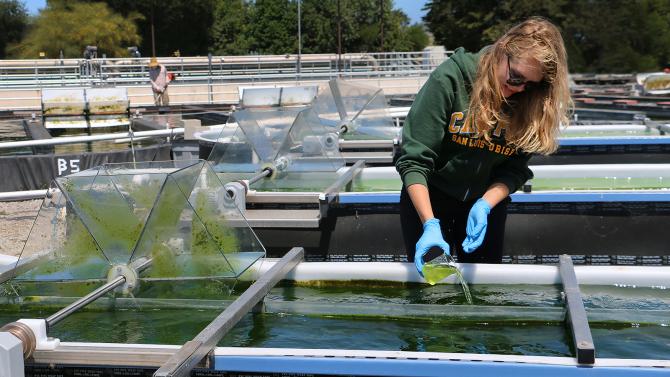Environmental Engineering
College of Engineering
Environmental engineers use the principles of engineering, soil science, biology and chemistry to develop solutions to environmental problems, such as unsafe drinking water, climate change and environmental sustainability.
San Luis Obispo, California
Environmental engineering offers a sound background in the fundamentals of thermodynamics, fluid mechanics, mass transfer, water resources and geotechnical engineering. Upper division courses cover important environmental engineering design topics as well as introductory civil engineering topics like water resources and geotechnical engineering.
Opportunities are available for undergraduate and graduate work in many fields of interest, with the following laboratories available for course work and research projects:
- Advanced Geotechnical Engineering Laboratory
- Bio-Environmental Engineering Laboratory
- Building Information Modeling (BIM) Technologies Laboratory
- Cannon Corporation Water Resources Laboratory
- Chevron Environmental Protection Engineering Laboratory
- Clark Pacific Civil Engineering Materials Laboratory
- Computer-Aided Design Laboratory
- Computer Laboratory
- Computer and Senior Design Laboratory
- Environmental Engineering Chemical Wet Laboratory
- Geotechnical Engineering Laboratory
- Hal Cota Air Measurements Laboratory
- Pavement and Advanced Materials Laboratory
- Power Engineering Construction Co.
Environmental engineering majors are able to participate in a blended program where you can earn your bachelor's and master's degrees at the same time.
To be eligible for the program, you must have completed all required support and CE/ENVE 300-level classes. Participation in the program is based on prior academic performance and other measures of professional promise, with a minimum GPA of 3.0.
BS Environmental Engineering and MS Civil and Environmental Engineering
About the Program
Environmental engineering will teach you how to assess and find solutions for air and water pollution, industrial hygiene, environmental health and safety, solid waste management, hazardous waste management, pollution prevention and more.
Our program prepares you for professional life and we consult industry experts in California and throughout the word regularly for input on our curriculum. You will work in well-equipped, state-of-the-art laboratories and use your understanding of essential engineering skills to solve real-world problems. The program is accredited by the Engineering Accreditation Commission of ABET.
Learn by Doing
From creating processes to restore air quality to converting waste into power, our hands-on labs and partnerships with industry allow you to work on real projects and research. This allows you to develop the design techniques and the communication, problem-solving and analysis skills you will need to solve some of the world's most complex and important problems.

Upgrade a Community’s Wastewater Plant
Our Graduates
Environmental engineers may find employment with various private and public organizations, including federal, state and local governments. They may design, plan and implement measures improving recycling, waste disposal and treatment, public health and pollution control technology.
